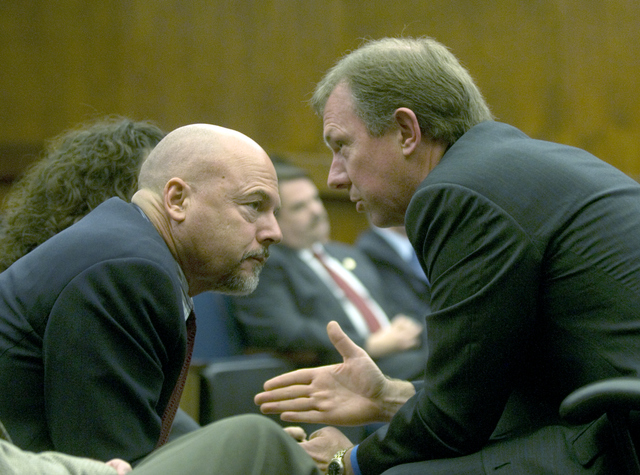Jail Manager Fired for Cancer or Just Cause?
11-Year Veteran Grady Williams Suing County of Santa Barbara for Millions

The longtime chief manager of Santa Barbara’s new jail project is suing the county and fighting for his job back after he was fired last summer amid accusations of misconduct. Grady Williams, however, claims he was dismissed because he asked for a lighter work load to treat his advanced cancer, and that the move was both politically motivated and shortsighted, leaving the biggest project in Santa Barbara history without a leader and with the possibility of unnecessarily costing taxpayers lots of money.
In two separate but related civil filings, Williams is seeking upwards of $5 million in lost wages, future earnings, and compensatory damages. A decision in one of the cases will be made by Judge Donna Geck this Friday.
Williams was fired from his post in the General Services Department for allegedly misleading staff and the public by using the initials “PE” (professional engineer) in his title on business cards, emails, letterhead, and other official documentation. The decision was handed down in June by General Services Department director Matt Pontes, who was hired by former CEO Chandra Wallar two months earlier. Williams is licensed as a professional engineer in Washington state, but not California.
During his 11 years with the county, Williams also served as its Capital Projects Manager, overseeing the construction of the Emergency Operations Center, Santa Maria’s new court facilities, and the Family Resource Center and Library in Cuyama. He partnered with Sheriff Bill Brown to secure an $80 million state grant for the new jail, and was in charge of selecting and hiring architects, engineers, and other consultants to design and construct the massive building.
When he learned of his termination by email during a long-awaited vacation, Williams hired attorney Matt Clarke and appealed to the county’s Civil Service Commission, a five-member, quasi-judicial body appointed by the Board of Supervisors that oversees employment matters. After conducting interviews and reviewing evidence presented by Williams, Pontes, and the county’s Human Resources Department, the commission ruled in November that Williams should be re-instated “with full back pay, benefits, and interest, and should otherwise be made whole.”
In a lengthy list of findings, the commission stated Williams “held a mistaken but good faith belief” that it was permissible to use PE in his title in California as he had during previous jobs with the U.S. Army Corps of Engineers and the Goleta Water District; he never meant to misinform his department about his credentials, and it was well-known among his colleagues and clients that he was only licensed in Washington; Williams never held a position or performed duties that required a California license; and he was never previously ordered or admonished to drop the PE from his title. (In separate legal filings, Williams asserts that he was actually told to use the initials by a former boss.)
The commission stated that Pontes fired Williams with the inaccurate conviction that Williams was actively trying to skirt the rules, noting that Pontes wanted to “communicate to other Department employees … that [he] would be holding them to high standards.” The commission also said Pontes “speculated that [Williams’s] use of the P.E. designation might result in potential liability to the County of Santa Barbara and negative media attention. However, Pontes’ concerns in this regard were unwarranted and unjustified.”
Lastly, the commission noted that Williams, who was bestowed with multiple commendations during his career and never received an unsatisfactory performance evaluation, was cleared of any wrongdoing by the Board of Professional Engineers after the county filed a complaint with the organization. The engineers board advised Williams to simply say that his license is from Washington if he uses PE in his title in California.
Despite the order of re-instatement, the county has told Williams to stay home while it challenges the decision. In a surprising and very rare move, the county counsel office has sued the Civil Service Commission, alleging it overstepped its authority and failed to offer proper and legal reasons why Williams should be given his job back. Attorneys argue that even if Williams didn’t act in bad faith by using the acronym, he still committed a misdemeanor and a fireable offense. The February 14 filing asks the court to overturn the commission’s order and argues that if Williams is reinstated, the county will “have to move personnel around in the department, and potentially initiate a layoff to create funding and a vacancy.”
Judge Donna Geck denied county counsel’s request in a preliminary ruling on April 18, noting that contrary to the county’s assertion, no layoffs would be necessary because the General Services Department is still advertising to fill Williams’s former jail manager position. Geck will deliver her final decision this Friday, after months of delay-inducing motions filed by the county. County counsel Mike Ghizzoni, along with Pontes, said they couldn’t comment on pending litigation.
At the time of his termination, Williams was both managing the jail plan and heading the Capital Projects division within the General Services Department. Those duties have since been split, and Capitol Projects job has been filled. Though Williams has been told to stay out of the office, the county continues to accrue the cost of his salary, benefits, and overhead, which totals around $150,000 a year. The department had an operating budget last year of $41.3 million and employed the equivalent of 113 full time positions.
Williams has also filed a wrongful termination lawsuit against the county that makes allegations of discrimination and retaliation. That case entered the court system on March 26 and remains in its preliminary stages. In the suit, and as explained by Williams during a recent interview, Williams was diagnosed with Stage 3 cancer in May 2010 that required surgery, radiation, and chemotherapy. He kept the news quiet for fear of losing out on possible promotions.
In April 2013, Williams was still feeling the effects of the disease, and he provided the county’s Human Resources Department with a letter from his oncologist advising him to limit his work day to 8 hours, lower his stress, get exercise, and take regular meals. Williams said he was working 50-60 hours a week at the time, but no changes were made to his schedule, despite the letter. Williams also said that a Human Resources rep told him she intended to disclose his health problems to Pontes because he would see the information anyway when Pontes reviewed Williams’s personnel file, and because supervisors must be informed of such matters.
Not long after, during one of their regular one-on-one meetings, Pontes allegedly asked Williams if he “had the strength” to continue with the lengthy and demanding jail project, which is expected to take another five years to complete. Pontes brought up the PE issue at the next meeting, and fired Williams three weeks later.
Williams said that Pontes may have felt threatened by his expertise on the jail project and speculated that there were other such motives for his termination. During meetings between Williams, Pontes, and CEO Chandra Waller, Pontes was reportedly unable to contribute much to the discussion, and when he did, he was often chastised or belittled by Wallar.
Wondering if Pontes fired him to protect or advance his own career, Williams claims there have been other grumblings in the department since Pontes came on board, and that he occasionally displayed the overly demanding and micro-management style that defined Wallar’s brief and contentious time with the county. Williams also said that he and County Counsel Mike Ghizzoni regularly butted heads over multiple jail matters, and stated his termination and Ghizzoni’s involvement in trying to uphold it may be more personal than professional.
Williams, married with three children, said his cancer was detected again this January and that he’s begun a new regime of doctors’ appointments. Nevertheless, he said he’s ready and able to go back to work on the North County jail project. In the meantime, he’s consulted on Contra Costa County’s new jail and other building initiatives, but said he can’t afford the ups-and-downs of a consulting business with a family to feed and a mortgage to worry about.
More importantly, Williams went on, he needs access to quality health insurance after issues with COBRA left his medical care in serious financial limbo. He said he suspects his career will remain relatively stagnant if and when he is reinstated, but that he needs and wants to stay in Santa Barbara for a variety of personal and practical reasons.
Of his long-running battle with the county and its attorneys, Williams said simply, “I put in 11 good years. I think they can treat me a little better.”


